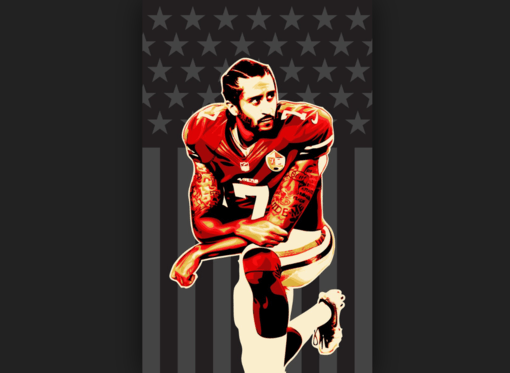
Art by Evan McCarthy | CC BY 2.0
In his classic movie, The Great Dictator, produced in 1949 when Hitler’s fascist juggernaut was sweeping all before it in Europe, Charlie Chaplin delivered the greatest speech in movie history – a call to arms that has resonated ever since:
“Don’t give yourselves to these unnatural men – machine men with machine minds and machine hearts! You are not machines! You are not cattle! You are men! You have the love of humanity in your hearts! You don’t hate! Only the unloved hate – the unloved and the unnatural! Soldiers! Don’t fight for slavery! Fight for liberty!”
At a time when mainstream America is engaged in a campaign to reassert the values of tolerance, equality, and human rights with which it has long sought to associate itself, one man’s travails are stark evidence of the gulf that lies between the myth and the reality.
In failing to conform to the received truths that continue to feed the mythology of a nation drowning in cant and hypocrisy, NFL quarterback Colin Kaepernick has found himself on the receiving end of its wrath. His decision to refuse to stand for the national anthem before an NFL pre-season game last season, in protest at racial injustice, has seen him shut out of the sport this season, with no club willing to sign him.
Specifically, the 29-year old quarterback’s stand was undertaken in solidarity with the growing number of black and minority victims of police brutality in America, and in protest at the lack of prosecutions with regard to the officer’s involved. “I am not going to stand up to show pride in a flag for a country that oppresses black people and people of color”, he told the press afterwards. “To me, this is bigger than football and it would be selfish on my part to look the other way. There are bodies in the street and people getting paid leave and getting away with murder.”
Kaepernick received a tsunami of criticism over his decision to sit for the anthem, demonized as unpatriotic and a disgrace to the NFL and his country, proving that if there is one thing America hates it is having its mask of democracy and liberty removed to expose a country in which to be black, brown, and/or poor is to be deemed unworthy.
Throughout the nation’s history, a number of black entertainers and athletes – the likes of Paul Robeson, Muhammad Ali, Tommie Smith, and John Carlos – have used their fame and celebrity to highlight America’s racial iniquities. Each paid a heavy price for doing so, yet, regardless, their names live on as a reminder that only live fish can swim against the tide, and that it is upon those with the courage to say no to injustice, who refuse to go along to get along, that justice depends.
As for those who insist that all Americans should respect the national anthem and the flag it reveres, here again we see the disjuncture between the myth of America and its ugly truth. The US national anthem, the Star Spangled Banner, was written by a man, Francis Scott Key, who had tasted defeat in the American War of Independence at the hands of former slaves fighting on the side of the British against the future of slavery and oppression that awaited in the event that the American Revolution prevailed, which of course it subsequently did.
Key’s disdain for black soldiers who dared take up arms to fight for their freedom from slavery and racial oppression is laid out in a verse of the Star Spangled Banner that nowadays is never sung — or at least certainly not in public. To wit:
And where is that band who so vauntingly swore,
That the havoc of war and the battle’s confusion
A home and a Country should leave us no more?
Their blood has wash’d out their foul footstep’s pollution.
No refuge could save the hireling and slave
From the terror of flight or the gloom of the grave,
And the star-spangled banner in triumph doth wave
O’er the land of the free and the home of the brave.
When Malcolm X said, “I see America through the eyes of the victim. I don’t see any American dream, I see an American nightmare,” he was closer to the truth of the United States than the mythology represented in the stirring words of the Star Spangled Banner. It is why he was loathed by mainstream America up until his death, and it is why Colin Kaepernick is loathed today. In refusing to stand for the national anthem he took a stand against national hypocrisy, doing so on the side of those for whom injustice and America are two sides of the same coin. The fact that he now finds himself being punished for it only confirms that he was right.
However unwittingly, he has become a beacon of decency in the world of professional sports, a world of such unfettered greed and excess it provides a glimpse of the capitalist dystopia that lies in our future unless we are able to summon the will to break the machine before it breaks us.